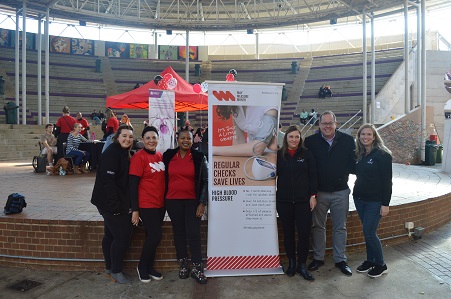Experts Address Hypertension Awareness And Prevention On World Hypertension Day
In recognition of World Hypertension Day, the NWU Hypertension in Africa Research Team (HART) organised a blood pressure monitoring event as part of the May Measurement Month initiative. The event aimed to raise awareness about hypertension or high blood pressure, shedding light on the importance of early detection and prevention. Distinguished researchers from HART shared valuable insights on hypertension, its risk factors and effective measures to reduce or prevent high blood pressure.
Prof Carina Mels, director of the NWU Hypertension in Africa Research Team (HART), emphasised the significance of initiatives like May Measurement Month in creating awareness of high blood pressure. Prof Mels stated: “HART is very proud to be part of the May Measurement Month initiative. This initiative was launched by the International Society of Hypertension to create awareness of high blood pressure. We normally talk about the 50-50-50 rule. Only 50% of people with hypertension are aware that they have this condition. That is why awareness campaigns like this one are so important.” She further explained that of those aware of their high blood pressure, only 50% receive proper treatment, and only 50% of those receiving treatment have their blood pressure under control. Prof Mels stressed the vital role of awareness in motivating individuals to monitor their blood pressure and to detect and seek treatment for high bloodpressure.
Expanding on the different risk factors associated with hypertension, Prof Lebo Gafane-Matemane, a respected member of HART, provided valuable insights. “There are two types of risk factors for developing hypertension. The first type is non-modifiable or uncontrollable risk factors, and those are the things you cannot change. The second type is modifiable or controllable risk factors, and those are the things that you can do something about,” she explained. Prof Gafane-Matemane highlighted genetic predisposition, advancing age and gender differences as examples of non-modifiable risk factors. On the other hand, she emphasised the importance of addressing modifiable risk factors such as unhealthy dietary habits, smoking, excessive alcohol consumption, a sedentary lifestyle and other unhealthy behaviours. Prof Gafane-Matemane stressed that the accumulation of risk factors directly increases the likelihood of developing hypertension.
To further guide individuals in reducing the risk of high blood pressure, Prof Wayne Smith, another esteemed member of HART, shared valuable strategies. Prof Smith outlined several key measures, stating: “Firstly, you can reduce your body weight, which is directly linked to your blood pressure. Secondly, engage in regular exercise, aiming for approximately 30 minutes per day. Thirdly, adopt healthy dietary habits, including the consumption of ample fruits and vegetables prepared in ways that retain their nutritional value, such as steaming or consuming them raw.” Prof Smith highlighted the positive impact of consuming beetroot to lower blood pressure. He further advised reducing salt intake, not only from table salt but also from hidden sources in processed foods and cereals. In addition, he emphasised the importance of reducing the consumption of fats, sugars, alcohol and caffeine, along with quitting smoking. Prof Smith concluded by underscoring the significance of stress reduction and relaxation techniques, as chronic stress directly affects blood pressure.
The collective expertise of Professors Carina Mels, Lebo Gafane-Matemane and Wayne Smith provides valuable insights into hypertension, its risk factors and practical steps individuals can take to reduce the risk of high blood pressure. Their shared knowledge and guidance reinforce the importance of early detection, lifestyle modifications and the adoption of healthy habits to maintain optimal blood pressure levels and minimise the chances of developing hypertension.
On World Hypertension Day and beyond, let us embrace these recommendations, incorporating them into our daily lives to have a positive impact on our blood pressure and reduce the risk of hypertension.

